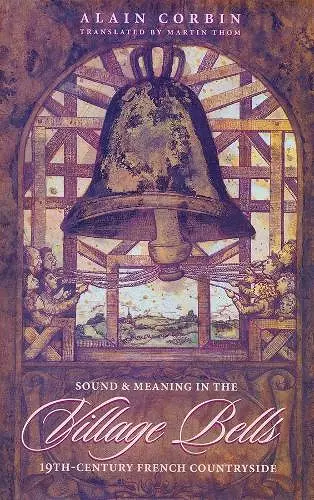Village Bells
The Culture of the Senses in the Nineteenth-Century French Countryside
Alain Corbin author Martin Thom translator
Format:Hardback
Publisher:Columbia University Press
Published:6th Nov '98
Currently unavailable, and unfortunately no date known when it will be back

A story of lost sensory experiences and forgotten passions, the latest work from renowned historian Alain Corbin recounts the history of nineteenth-century French rural life through the countryside's numerous bells.
In the French canton of Brienne in November 1799, local authorities were scandalized when a crowd of girls broke through the doors of the church and rang the bells in order to mark the festival of St. Catherine. Religious use of the bells was forbidden by law, but the villagers boldly insisted on their right to celebrate with peals the feast of a beloved saint. So begins Village Bells, Alain Corbin's exploration of the "auditory landscape" of nineteenth-century France, a story of lost sensory experiences and forgotten passions. In the nineteenth century, these instruments were symbols of their towns and objects of both ecclesiastic and civic pride. Bell-ringing served practical purposes of communication, marking both religious and secular time, as well as calling citizens to pray, assemble, take arms, or beware of danger. As Corbin shows, the bells also reflected the social, political, and religious struggles of the time. To control the bells was to control the symbolic order, rhythm, and loyalties of French village and country life. Using church archives and local documents, Corbin forges a unique history of the role of bells from the aftermath of the Revolution to the dawn of the twentieth century. He charts how the First Republic (1792-1804) moved toward a more secular society, turning many bells into coins and cannonballs and seizing others as property of the state. A gradual return to the religious use of bells occurred in the nineteenth century, even as their new secular roles were maintained. Corbin describes the battles over the marking of religious versus secular time, as calls to prayer, the celebration of religious feasts, and the marking of rites of passage-baptism, marriage, and death-competed with tolls indicating the passing hours or marking assemblies, elections, or republican holidays. Thoroughly documented and recounted with intriguing narratives, Village Bells provides an original approach to nineteenth-century French cultural, social, and political history. As Corbin notes, the bells are no longer essential to our lives-their qualitative, sacred time and space replaced by the quantitative, secular measures of the clock-but by understanding their lost symbolic and practical importance we open a window onto the age in which they rang.
Promises to open new avenues of historical research and reflection. -- Lynn Hunt, UCLA The New Republic One of France's most original historians, Alain Corbin has set himself the task of documenting the 'culture of the sense'in nineteenth-century France. Village Bells addresses the 'auditory landscape,'looking at the crucial place of sound as a means of communication in the lives of ordinary people: bells sounded alarms and celebrated joyous occasions, they spread news of individuals and men of state, announced arrivals and departures, summoned villagers to religious and civic ceremonies, and marked the passing of the hours of the day. The place of bells and the practice of bell-ringing could be a source of conflict and great political tension. Beautifully written, brilliantly interpreted, full of the stories that reveal the strange difference of the past, the book is at once a rich cultural history and a meditation on the craft of the historian-a craft Corbin practices in startlingly imaginative and pleasingly unconventional ways. -- Joan W. Scott Institute for Advanced Study
ISBN: 9780231104500
Dimensions: unknown
Weight: unknown
416 pages